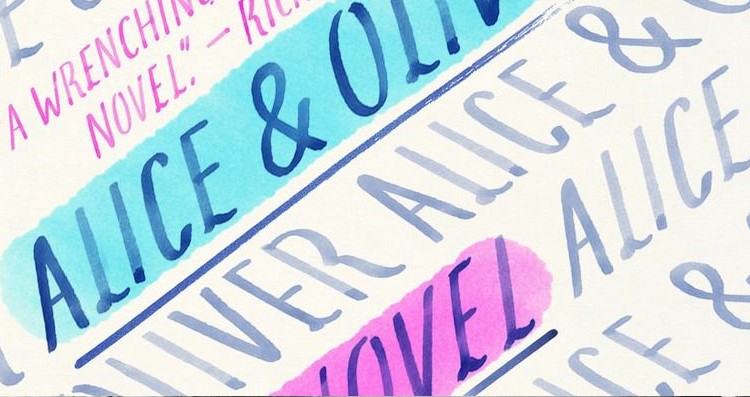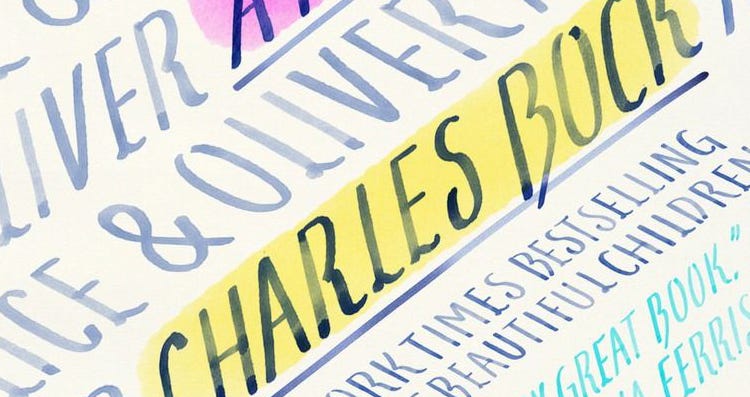Books & Culture
We Need To Talk About Alice and Oliver
Charles Bock’s cancer novel works best when it’s not about Alice or Oliver

It would be easy to characterize Charles Bock’s Alice and Oliver as just another cancer novel. The book is inspired by Bock’s late wife, Diana Joy Colbert, who battled AML (acute myeloid leukemia) in her thirties. She underwent two stem cell transplants and passed away two-and-a-half years after diagnosis. As a stem cell transplant patient myself (twenty-one months later, I still hesitate to even consider uttering the word “survivor”), I was tempted to read Alice and Oliver as a detailed chronicle of the rigors of enduring one of the most harrowing and risky medical procedures in existence — just to connect with someone else who went through it.
As such a chronicle, Bock’s novel does not disappoint. Much like in the finest, recent cancer memoirs (Paul Kalanithi’s When Breath Becomes Air or Mortality by Christopher Hitchens), one can clearly imagine the experience of terminal cancer. Bock captures how you can feel dropped into an ocean of new clinical vocabulary, each word carrying life-and-death stakes. With every indignity faced by Alice (the fictive version of Bock’s late wife), I relived my own experience: each failed needle-prick into a collapsed vein, each performance of what Alice humorously refers to as “ass gymnastics” when providing those all-too-frequent stool and urine samples.
Bock also painstakingly renders our American healthcare system in all its logic-free anti-glory. You might ask yourself whether the daily hellscape of legalese, faxed letters, and maddening conversations with hospital bureaucrats is even worse than dying from cancer.
“As a stem cell transplant patient myself, I was tempted to read Alice and Oliver as a detailed chronicle of the rigors of enduring one of the most harrowing and risky medical procedures in existence.”
The novel is weaker, however, in its depiction of Alice and Oliver as individuals. A super mom with a fondness for Eastern religion and a passion for fashion, when we first see Alice, she is “rocking knee high boots” with her infant daughter strapped to her chest. Oliver is a computer programmer and entrepreneur with a short fuse who can’t stop observing how cool and gritty the Meatpacking District used to be. Both come close to being Manhatttanite clichés: well-educated, creative, and most notably, privileged.
Though facing serious misfortune, Alice and Oliver often seem oblivious of their level of entitlement. The fictional Whitman Hospital on York Avenue between East 67th and 68th Street is a thinly-veiled stand-in for the place I was lucky enough to receive my transplant: Memorial Sloan Kettering, the top cancer center in the country, maybe even the world. During an especially trying night in the hospital, Alice tries “to inhabit her best self” by asking each nurse assistant “to say her name,” so she can make “comic guesses as to the origin countries of their accents,” without any awareness of her condescension. She’s not above disobeying doctor’s orders or throwing a tantrum when she discovers she can’t see her child during treatment, even after her doctor explains that the germs any child under eleven might bring into the hospital could kill her and other severely immunocompromised patients.
In Oliver’s eyes, Dr. Bhakti, an Indian woman, is always saying or doing something insensitive, like daring to touch her hair while Oliver’s wife has to endure chemo-caused baldness. In a dispute over medical bills, Oliver agitates the hospital’s African-American account payable clerk to the point her English breaks down:
“My job, I make sure the hospital gets paid for the services it provide, okay? That ain’t me, that’s policy. If you need, we got all kinds of financial aid and payments options to our patients.”
No one in the book calls Alice and Oliver out on their difficult behavior, and neither character seems particularly bothered by the fact that every annoying person on their grim journey happens to be a person of color, while everyone helpful is white, leaving us to wonder whether these unsettling character notes are intentional.
As a novel about marriage, Alice and Oliver is at its most successful. Bock paints how marriage can help these two flawed individuals transcend their own limitations in a time of crisis. Together, as a couple, Alice and Oliver are warm, their rituals endearingly specific. They meet at a coding party in the late-eighties, and a twenty-seven year-old Alice nicknames Oliver “Bushytop” and loses “a fight against his oncoming smile.” She’s drawn to him because he’s “unlike everyone in the fashion world,” and gives “off a hetero vibe,” and is “not in any way uncute.” Years later, when facing their toughest moments in the hospital, they call each other “favorito.” In this astounding scene, a ravaged Alice tries to provide Oliver, whose life has been subsumed by caretaking responsibilities, some sexual relief:
Enveloping him, her mouth was warm, wet. His shoulders hunched and he let out an involuntary high sound; his head leaned back and he shut his eyes; his right hand went onto the back of her head. Oliver felt the barren desert of her skin. The air in the room warmer, her breaths coming at shorter intervals. She went at him, gallant and resolute, going faster, her eyes shut, cheeks pulsing.
But he was not close.
He was careful in lifting her off him, and he brought her to his face, and kissed her with all the tenderness in him, and on her lips tasted his own heat and salt.
Oliver pulled Alice’s bird-frail body to him. He took her face into his shoulder, caressed the back of her head, and laughed, amazed, holding her to him.
She was sobbing by now, and her sobs continued for a time, their force increasing, sending her body into racked, great heaves.
“Favorito,” he said. “Favorito.”
The scene is easily the best in the book — one of the more fraught and complicated portraits of the conjugal in recent memory. In the powerful and suspenseful final section of the novel, after multiple rounds of chemo, a bedridden Alice finally gets her desperately needed transplant, but the doctors are unsure if her frail body will survive the cure. In those make-or-break days, Bock hops between points-of-view, from Alice’s first-person journal entries to Oliver’s third-person perspective, then to all-too-short sections in the heads of Alice’s doctors and nurses — the people on the front lines of battling cancer for their patients. This break from the structure of the rest of the book creates a dramatic urgency that raises, for the reader, the possibility that Alice Culvert’s fate might differ from Diana Colbert’s.

Anyone — whether they’ve been through leukemia or whether they like Alice and Oliver or not — will empathize with the devastation that both the disease and its potential cure can cause. Bock’s fictive paean to his wife’s endurance reminds us that cancer leaves behind significant psychic trauma for both the survivors and those who are survived.









